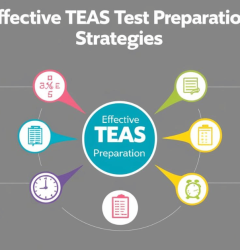- Email: hello@Tutoriffic.com
- Phone: (714) 941 0782

What Topics Should You Focus on for the TEAS Test?
The TEAS exam is a big deal for anyone aiming to get into nursing or allied health programs. It covers a wide mix of reading, math, science, and English topics—basically, everything you’re expected to know before stepping into a demanding academic environment.
But let’s be honest—many students waste time focusing on the wrong things. They flip through every page of every prep book without really understanding which topics matter most. That’s where frustration and burnout kick in.
The goal here is simple: help you focus on what counts. Whether you’re planning to study solo or you’re already wondering if you should pay someone to take my TEAS test, this guide walks you through the most essential topics and how to tackle them smartly.
1. TEAS Reading Section – What to Expect
This part tests your ability to understand, analyze, and interpret written material—skills you’ll use daily as a nurse or healthcare provider.
Key topics:
-
Finding the main idea and supporting details
-
Understanding tone, point of view, and author’s purpose
-
Making inferences and logical conclusions
-
Identifying cause-effect, sequence, and comparison structures
-
Evaluating arguments and spotting opinions vs. facts
-
Reading visual data (charts, tables, graphs)
Study tips:
-
Read news articles, science reports, or essays daily
-
Practice summarizing short passages
-
Take timed reading quizzes to boost speed and accuracy
If this section feels overwhelming, some students choose to take my TEAS exam with the help of professionals who specialize in high-stakes testing.
2. TEAS Math Section – Core Concepts You Need
The math portion focuses on practical problem-solving—not just theory. You’ll face everything from simple arithmetic to basic algebra and word problems tied to real-life medical situations.
Key topics:
-
Fractions, decimals, percentages
-
Ratios, proportions, and unit conversions
-
Solving equations and inequalities
-
Measurement problems
-
Data analysis: charts, tables, and statistics (mean, median, mode)
-
Word problems that require logical setup and steps
Study tips:
-
Review one core topic per day
-
Use flashcards for formulas and conversions
-
Time yourself solving 10–15 problems at a stretch
If math just isn’t your thing, there’s always the option to pay someone to take my exam and avoid the frustration entirely.
3. TEAS Science Section – High-Yield Topics
For many students, science is the toughest section. It covers a lot, and much of it requires more than just memorization—you need to understand how concepts connect.
Key topics:
-
Human body systems: respiratory, cardiovascular, digestive, nervous, and more
-
Cell biology, including structure, function, and mitosis
-
DNA, genetics, and heredity
-
Chemistry basics: atoms, molecules, periodic table
-
Microbiology and disease prevention
-
Scientific reasoning and interpreting experiments
Study tips:
-
Use labeled diagrams for anatomy
-
Practice identifying functions of organs and systems
-
Review flashcards daily for chemistry terms
If these concepts seem too complex, it’s common to hire someone to take my TEAS exam and let an expert handle it.
4. TEAS English and Language Usage – What to Focus On
This section is all about your grammar, punctuation, and word usage. It’s not as simple as it sounds. One missed rule can throw off an entire sentence.
Key topics:
-
Parts of speech and grammar rules
-
Verb tenses, subject-verb agreement
-
Sentence structure and punctuation
-
Word meaning in context
-
Commonly confused words
-
Sentence clarity and logical flow
Study tips:
-
Do short grammar drills regularly
-
Read sample texts and edit them
-
Expand your vocabulary using TEAS word lists
Need help with English prep? You’re not alone. That’s why some students decide to pay someone to take my TEAS test and secure solid results without second-guessing every sentence.
5. Test-Taking Strategies That Make a Difference
Knowing the content is half the battle. The other half? Knowing how to take the test.
Try this:
-
Set a timer for each section based on question count
-
Eliminate obviously wrong choices before picking an answer
-
Flag tough questions and revisit them if time allows
-
Don’t panic if something looks unfamiliar—breathe, reset, move on
Can’t shake the anxiety or time pressure? It’s completely valid to pay someone to take my TEAS exam and reduce the pressure.
6. Practice With Real TEAS Materials
This can’t be stressed enough. Using random practice questions or outdated content doesn’t help.
What to use:
-
Official TEAS guides
-
Reputable online prep courses
-
Practice tests that mimic real exam conditions
-
Flashcards for definitions, formulas, and anatomy
Daily practice—even 30 minutes—makes a huge difference. And if that still feels like too much, you can always take my TEAS exam through a reliable testing service.
7. How to Stay on Track While Studying
Motivation is tricky. Some days you’ll be on fire. Others, not so much. That’s normal.
To keep going:
-
Set small daily goals
-
Track your progress (don’t just study aimlessly)
-
Take breaks and reward yourself
-
Join a study group—or even just talk through questions with a friend
If nothing seems to help and you’re falling behind, it’s okay to look at professional options. Many students pay someone to take my TEAS test to make sure they don’t lose their shot at admission.
Quick Overview: What to Focus on for the TEAS Test
| Section | Key Topics | Smart Strategies |
|---|---|---|
| Reading | Main idea, author’s purpose, inferences, text structures | Read actively, summarize, take timed practice tests |
| Math | Fractions, ratios, algebra, word problems, stats | Solve 10+ problems/day, use flashcards, take full-length exams |
| Science | Human anatomy, cell biology, chemistry, genetics | Use visuals, take science quizzes, focus on high-yield terms |
| English | Grammar, punctuation, sentence clarity, vocabulary | Do drills, practice editing, expand vocabulary |
| Test Strategy | Timing, process of elimination, managing anxiety | Use timers, skip and return, stay calm under pressure |
| Expert Help | Test-taking assistance, score guarantees | Pay someone to take my TEAS test for support and results |
Final Thoughts: Focus Where It Counts
Studying for the TEAS test doesn’t mean doing everything—it means doing the right things. Focus on what matters most in reading, math, science, and English. Build a consistent routine. Use reliable prep tools.
And if you’re short on time, stuck on a subject, or just want to take the pressure off your shoulders, you can pay someone to take my TEAS exam and let professionals handle it for you.
FAQs: TEAS Test Topic Focus
1. What are the most important subjects on the TEAS?
Reading comprehension, basic math operations, anatomy and physiology, chemistry, and English grammar. Focus on these core areas for better scores.
2. How can I improve in the science section?
Start with body systems, cell biology, and genetics. Use flashcards, diagrams, and subject-specific quizzes to reinforce learning.
3. What’s the best way to prepare for TEAS math?
Practice fractions, percentages, algebra, and word problems daily. Review key formulas and solve under timed conditions.
4. Can I pay someone to take my TEAS test if I’m out of time?
Yes. If studying isn’t an option, many students choose to pay someone to take my TEAS test for guaranteed results and less stress.
5. How do I manage time on the actual exam?
Allocate time by question type, skip tough ones and come back, and use elimination strategies. If timing is a concern, consider professional support to pay someone to take my TEAS exam.


